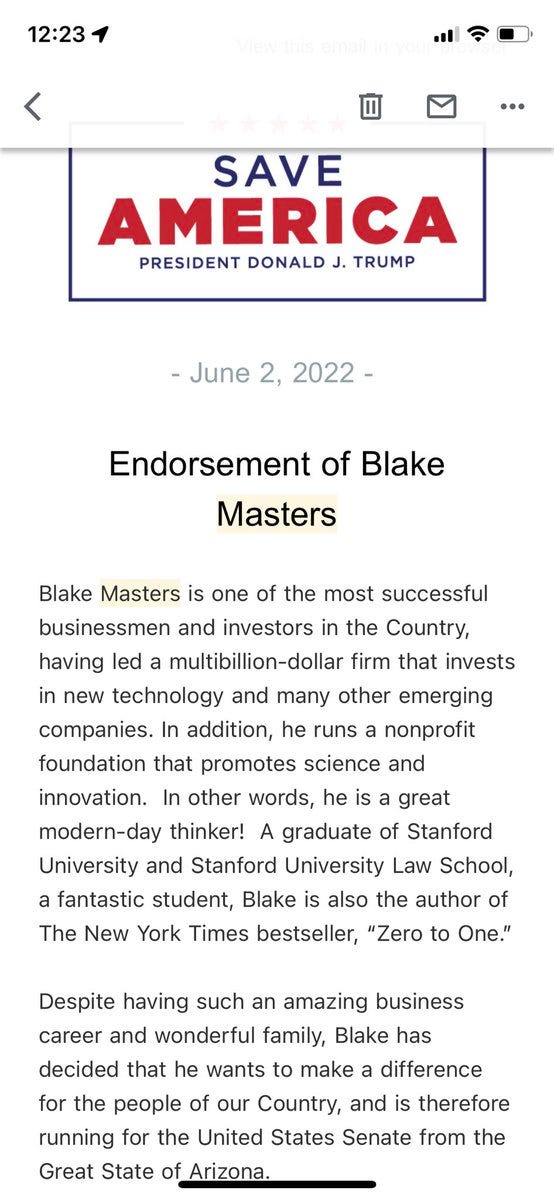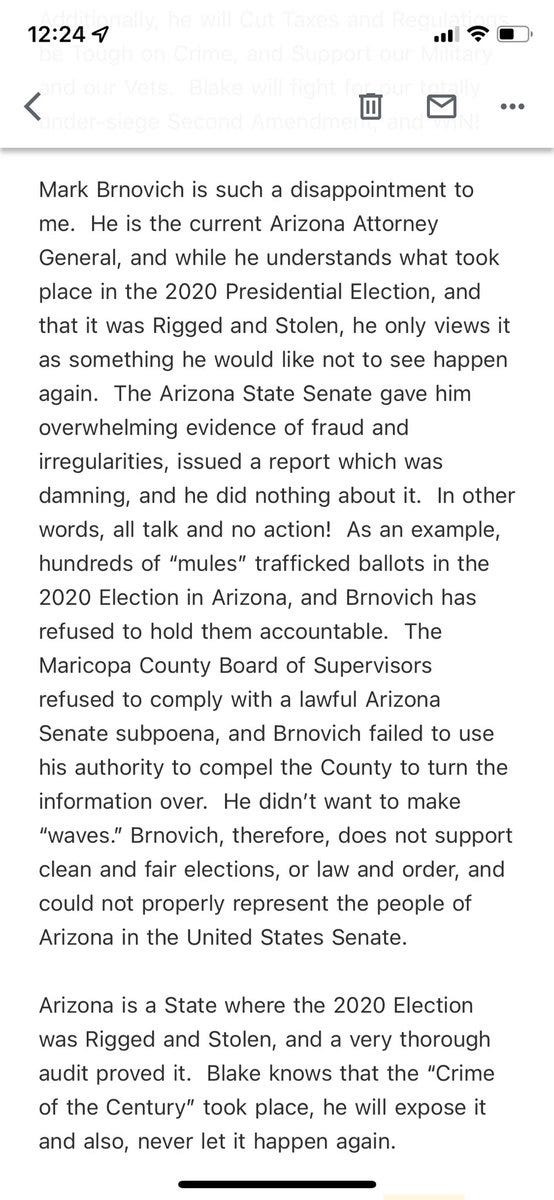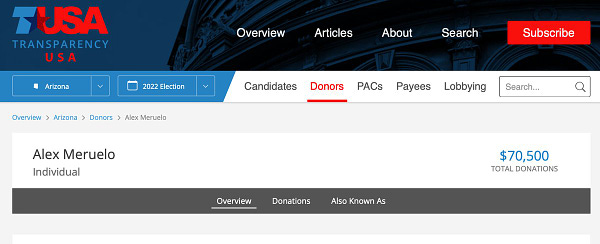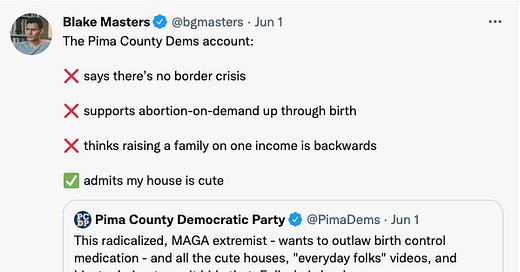The Daily Agenda: Trump rules the GOP, not Arizona
Endorsed by a loser ... Whatapalooza? ... And email is different there.
Blake Masters, the GOP U.S. Senate hopeful who’s built his name on Peter Thiel’s checkbook, finally got what he wanted: a highly coveted endorsement from former President Donald Trump.
You won’t see us talk about endorsements much around here. They rarely matter unless they’re super high-profile or surprising in some way, though they are a good signal to voters in low-information local races. They mostly serve as a way for candidates to keep sending us press releases.
But in this case, Trump’s endorsement could play a pivotal role in breaking up the crowded Republican primary to face U.S. Sen. Mark Kelly this fall. Masters is counting on Trump’s endorsement to surge him to the front of the pack, as Hank chronicled in Politico recently.



So far, Masters, businessman Jim Lamon and Arizona Attorney General Mark Brnovich have all struggled to take a strong frontrunner position — perhaps because they hardly differ on big issues like elections and the border.
Trump’s menu of endorsees across the country have not uniformly won their races. The results of his endorsement, while powerful enough for a host of candidates to come to Florida to kiss the ring, is middling. Candidates think they’ll be more like J.D. Vance (another Thiel beneficiary) and Mehmet Oz than Madison Cawthorn or David Perdue.
Brnovich and Lamon both issued statements after the endorsement that show just how much of a grip Trump has here, in a state where election denialism runs mainstream and MAGA still holds sway. They touted their MAGA bonafides and their work on “election integrity.” Lamon took swipes at Masters, his now-frequent punching bag.
Trump made it publicly clear for months now that he thought Brnovich was weak, though, according to Axios, Lamon sunk his own ship because he “talked about himself too much” when meeting the former president, who he compared himself to in an “off-putting” way.
No Republican candidates in Arizona are running against Trump and the path he led the Republican Party down for a simple reason: They couldn’t win a primary. About one-third of the electorate still follows his lead, and that’s more than enough to carry them through wide-open primaries to replace Arizona’s outgoing statewide officials.
But as candidates like Kari Lake continue to lean into their Trump endorsements (Lake recently cut a ow-dollar ad with a lo-fi video of Trump talking about why he likes her), it’s worth remembering that while his stranglehold over the Republican Party is unmatched, Trump lost Arizona in 2020, and there’s no indication he’s become more popular in the two years since.
Satan comes up a lot: The Republic’s Richard Ruelas and BrieAnna Frank take you inside the Sunday services of Turning Point USA’s Charlie Kirk, who has been holding a monthly political sermon at Dream City Church and painting political divides as a battle between good and evil.
But is it really a raise though?: When voters decided to increase the minimum wage by passing Prop 206 in 2016, they tied the increase to inflation, which is spiking, meaning the minimum wage could increase by more than $1 and approach $14 an hour at the start of 2023, the Republic’s Russ Wiles reports.
The truth is free: The Republic’s Mary Jo Pitzl breaks down how taxpayers have spent nearly $5 million so far on the state Senate’s audit of the 2020 election, which was supposed to cost $150,000. And the most egregious examples of election legislation that sprouted from lies of a stolen election largely haven’t made it through the Legislature, but not for a lack of effort.
The truth may be free, but quality local journalism is not. Subscribe now to make sure the Arizona Agenda always lands in your inbox at 6 a.m. sharp.
Gone but not forgotten: Republican U.S. Rep. Paul Gosar skipped the GOP primary debate hosted by Clean Elections and PBS for his new Congressional District 9, but he was there in spirit as all his competitors wanted to talk about him.
The worst palooza ever: Border vigilantes and QAnon adherents are planning a July 4 weekend extravaganza in Buenos Aires National Wildlife Refuge along the U.S.-Mexico border, the Arizona Daily Star’s Danyelle Khmara reports. They’re calling it “Borderwallapalooza.”
Tiny homes are better than no homes: Tucson’s dream of building a tiny house village for the city’s homeless population is one step closer to reality after the nonprofit working with the city received an offer to let them use 9 acres of land for free for the next five years, the Daily Star’s Caitlin Schmidt reports.


35 years is a long wait: The foreman of the jury that sentenced Frank Atwood to death for killing an 8-year-old Tucson girl roughly 35 years ago has no regrets and is relieved his sentence is finally being carried out, the Daily Star’s Henry Brean writes.
Just trust them: After complaints against mean girl judge Erin Otis initially were dismissed, ABC15’s Dave Biscobing takes a deep dive into judicial secrecy, finding that more than 97% of complaints filed against judges are dismissed and the public never knows why.
On art and guns: The Republic’s Anne Ryman explains the long and strange saga of the $100 million Willem De Kooning painting that was stolen from the University of Arizona and ultimately recovered. The guy who bought it for $200 was pretty freaked out when he realized he had a stolen $100 million painting on his hands.
“David Van Auker stashed it behind his couch, wrapped in a blanket, and got out his Colt .38,” Ryman writes.
Cross your fingers: The AZGOP’s lawsuit trying to outlaw early and mail-in voting, which more than 80% of voters use, got a hearing in Mohave County Superior Court Friday, and Capitol scribe Howie Fischer has the details. The judge could rule today.
“The Voice” can wait: The “driver” of a self-driving Uber that struck and killed a woman in Tempe in 2018 — the first pedestrian death from an autonomous vehicle — will likely go to trial after the driver rejected a recent plea deal that would have left her with a felony charge of "non dangerous" negligent homicide, the Republic’s Ryan Randazzo reports.
Booting the judge: Superior court actions allow each side to request a change of the judge, and while the Maricopa County Superior Court doesn’t keep comprehensive tally of how many change requests each judge receives, it recently did a limited analysis and found some judges are less wanted by the parties than others, the Capitol Times’ Kyra Haas reports.
Love them and hate them: Ballot dropboxes were wildly popular in 2020 with rural Arizona Trump voters who are now arguing the dropboxes were a major source of fraud as proven by the debunked documentary “2,000 Mules,” Votebeat’s Jen Fifield writes.
Trump wasn’t on the primary ballot: The former mayor of San Luis pleaded guilty to ballot harvesting in the primary election in 2020, taking a plea deal that saw prosecutors drop many other serious charges of conspiracy, forgery and ballot abuse, The Associated Press’ Bob Christie reports.
Hockey team in the desert: The Tempe City Council opened up negotiations that could get the Arizona Coyotes to come to town permanently, The Athletic reports, after the team decided to leave Glendale after a long and contentious relationship with the city.


Who’s bringing fentanyl?: While politicians often blame fentanyl seizures near the border on Mexican migrants, it’s often U.S. citizens who bring it across the border in cars, and almost never migrants crossing on foot, according to data compiled from Customs and Border Protection press releases about fentanyl arrests, KJZZ’s Alisa Resnick reports.
Let them innnnn: Democratic U.S. Rep. Ruben Gallego debriefs with the Republic’s Tara Kavaler about his latest trip to the Baltic region, where he spoke with the Turkish ambassador about letting Finland and Sweden into NATO.
Moving on up: The Washington Post hired Yvonne Wingett Sanchez, a veteran political reporter at the Republic, as its new “democracy reporter” in Arizona. Meanwhile, the Republic’s union boss Rebekah Sanders couldn’t help but tweet a final hot take on her soon-to-be-former colleague, highlighting, once again, the healthy work culture at the Republic.
Just don’t wear your Jordans to the club: Scottsdale is the new hottest destination for swanky bachelorette parties, making it either the new Nashville or the new Las Vegas, the New York Times tells us. We assume it has something to do with those annoying party bikes that a former political operative turned party-bike businessman got lawmakers to legalize a few years back.
The Russian version of email: Phoenix Mercury star Brittney Griner, who has been in Russian prison for more than 100 days for having some weed vape pens on her, is now allowed to email, sort of, the AP reports.
“The emails are printed out and delivered sporadically in bunches to Griner by her lawyer after they are vetted by Russian officials. Griner doesn’t have access to the email account; she’ll either write a response on paper and her lawyers will take a photo of it or she’ll dictate a response if she doesn’t have any paper.” the AP wrote.
Senate Bill 1633 would clarify and add to the laws that prohibit harassment.
The bill improves the definition of harassment to include “knowingly and repeatedly” harassing someone by contacting them, following them, surveilling them and more.
Republican Sen. Sine Kerr said during a committee hearing that the bill stemmed from work she did last year on “Kayleigh’s Law,” which seeks to protect victims of violent crimes.


We would NEVER laugh at a sloth unless one of them told us a joke, but we’re glad to see the slow-moving creatures get their well-deserved time in the spotlight. KJZZ’s Steve Goldstein heads down to the Arizona Science Center to meet the sloths Sash and JJ and find out what we in the fast-paced non-sloth world can learn from the sluggish animal.






